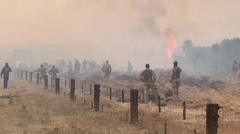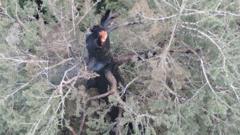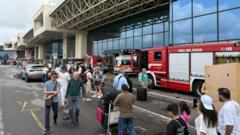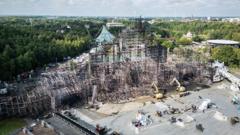The UK government has reached an agreement to compensate thousands of Kenyans impacted by a devastating fire during a British military training exercise in 2021, settling a prolonged legal dispute.
UK Agrees to Compensate Kenyans Affected by Military-Induced Fire

UK Agrees to Compensate Kenyans Affected by Military-Induced Fire
UK government settles legal claims with Kenyans over damage caused by a military training exercise fire.
In a significant development, the UK government has formalized compensation to nearly 7,723 Kenyans who experienced loss of property and health issues following a fire ignited by a British military training exercise in March 2021. This arrangement, framed as an out-of-court settlement, concludes an extensive legal struggle regarding the consequences of the incident, which devastated a significant portion of the Lolldaiga conservancy situated in Kenya's Rift Valley.
The reported compensation sum is estimated at £2.9 million, although the British government has withheld the specific amount. Officials from the British High Commission in Nairobi expressed regret regarding the fire's occurrence, emphasizing the substantial efforts and resources invested in resolving the numerous claims. While some claimants celebrated this resolution, others, including lawyer Kevin Kubai, criticized the compensation amounts as insufficient relative to their losses. He noted that pursuing individual cases in court would be a lengthy process, possibly extending up to seven more years.
The fire's cause was attributed to a camp stove that toppled during the military exercise, according to findings by the UK Ministry of Defence in 2022. The fire led to damage to around 7,000 acres (2,800 hectares) of private land, although community land was reportedly unaffected. Nevertheless, claimants argued that surrounding communities faced severe environmental ramifications and property losses due to the chaotic flight of wildlife triggered by the blaze.
Despite this resolution, it should be noted that military training operations at the Lolldaiga conservancy will continue, without any immediate delays to scheduled exercises. The British government has been involved in efforts to rehabilitate the burnt areas within the conservancy.
The Lolldaiga conservancy, encompassing approximately 49,000 acres teeming with bushland and a view of the ice-capped Mount Kenya, has a complex historical narrative rooted in colonial land confiscations, which still reverberate today through ongoing land disputes. Additionally, the British Army Training Unit Kenya (Batuk), based nearby, has significantly contributed to Kenya's economy over the years, albeit not without controversies concerning soldiers' conduct, including severe allegations of violence and exploitation.
This case underscores the lingering impact of colonial legacies and military activities on the local population, as well as the challenge of reconciling past grievances with current interests.




















